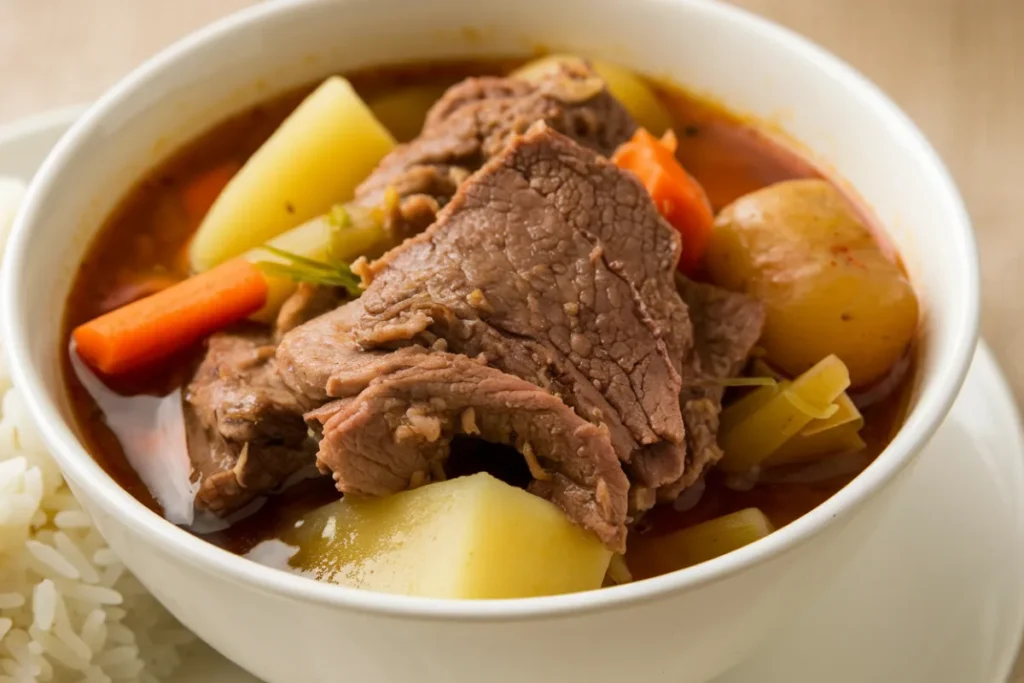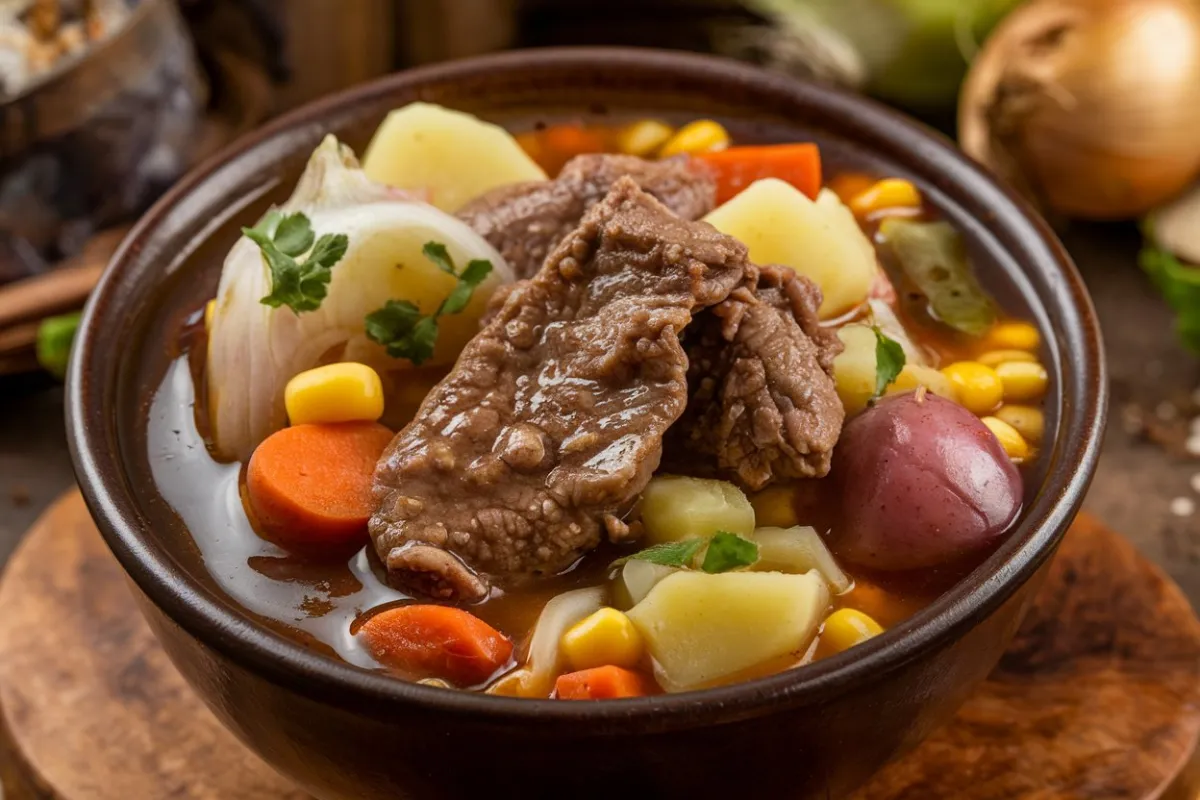Caldo de Res, a traditional Mexican beef soup, has been cherished for generations for its rich flavors and nourishing qualities. This hearty dish brings together beef, vegetables, and spices to create a meal that is both satisfying and flavorful. But is it truly healthy for you? In this comprehensive guide, we will explore the nutritional aspects of Caldo de Res, examine its health benefits and potential downsides, and provide tips on how to make it a healthier option tailored to different dietary needs.
What is Caldo de Res Made Of?
At its core, Caldo de Res relies on natural ingredients to create a wholesome soup. Let’s break down the key components:
- Beef: Recipes often use beef shank or bone-in cuts to add both flavor and nutrition. The marrow in the bones releases collagen and nutrients during cooking, which enhances the broth’s flavor and health benefits.
- Vegetables: A variety of vegetables like carrots, potatoes, corn, zucchini, and cabbage add color, texture, and essential vitamins, minerals, and dietary fiber.
- Herbs and Spices: Garlic, onions, cilantro, and lime juice are commonly added to boost flavor. These ingredients also provide health benefits, such as antioxidant properties and immune support.
Together, these ingredients create a nutrient-rich meal that is more than just comfort food. It is a dish packed with vitamins, minerals, and proteins that contribute to a balanced diet.
Nutritional Profile of Caldo de Res
To determine whether Caldo de Res is healthy, we need to look at its nutritional profile. A typical serving provides:
- Protein: Beef supplies a substantial amount of protein, which is essential for muscle repair, immune function, and overall body maintenance.
- Vitamins and Minerals: The vegetables offer essential vitamins such as Vitamin A (supports eye health and immune function), Vitamin C (improves skin health and boosts the immune system), and several B vitamins (important for energy production and brain function). Minerals like iron (crucial for oxygen transport in the blood) and potassium (helps regulate blood pressure and fluid balance) are also present.
- Collagen and Gelatin: When you use bone-in cuts, the soup includes collagen and gelatin, which support joint health, skin elasticity, and gut health. For more information on these benefits,
Although Caldo de Res is nutrient-dense, its calorie content can vary based on the ingredients. Typically, a serving contains around 234 to 300 calories. To learn more about the nutritional value of beef,
Health Benefits of Caldo de Res

Several factors make Caldo de Res a healthy choice. Here are some primary health benefits:
1. High in Protein
Caldo de Res provides a great source of protein, mainly from beef. Protein plays an essential role in:
- Muscle Repair and Growth: It helps build and repair muscle tissue, especially in physically active individuals.
- Immune Function: Protein aids in producing antibodies that help the body fight infections.
- Satiety and Weight Management: Foods high in protein help you feel full longer, which can reduce overall calorie intake and support weight loss.
2. Rich in Vitamins and Minerals
The wide variety of vegetables used in Caldo de Res provides many essential vitamins and minerals:
- Vitamin A: Found in carrots and other vegetables, supports vision, immune function, and skin health.
- Vitamin C: Present in many of the vegetables, helps with collagen production, skin repair, and boosts the immune system.
- Iron: Beef offers a high level of heme iron, which the body absorbs more readily than non-heme iron from plant sources.
- Potassium: Helps maintain proper heart function and balances fluids in the body, reducing the risk of hypertension.
3. Benefits of Bone Broth
Using bone-in beef in Caldo de Res releases nutrients from the bones during cooking, such as:
- Collagen: This protein supports joint health and improves skin elasticity.
- Gelatin: It aids in digestion and soothes the digestive tract.
- Minerals: Provides calcium, magnesium, phosphorus, and other trace minerals that are crucial for bone health.
4. Helps with Weight Management
Because it is high in protein and relatively low in calories, Caldo de Res can effectively support weight management. The protein helps you maintain muscle mass while dieting and promotes satiety, reducing the temptation to overeat.
5. Contributes to Hydration and Electrolyte Balance
Since Caldo de Res is a soup, it naturally helps you stay hydrated. The vegetables, such as zucchini and carrots, contribute potassium, which helps maintain a healthy electrolyte balance.
Potential Downsides of Caldo de Res
Despite its many benefits, Caldo de Res has some potential downsides:
1. High Sodium Content
Traditional recipes may contain high amounts of salt, which could be problematic for people with high blood pressure or those on a sodium-restricted diet. However, you can reduce the sodium content by using low-sodium broth or limiting added salt.
2. Contains Saturated Fats
The choice of beef cuts affects the amount of saturated fats in the soup. Consuming too much saturated fat can raise LDL cholesterol (the “bad” cholesterol), potentially increasing heart disease risk. To lower saturated fat, choose leaner cuts of beef.
3. Possible Allergens
For some individuals, ingredients in Caldo de Res may trigger allergies. Common allergens include beef, and some recipes may have wheat-based seasonings or other potential allergens.
Caldo de Res and Weight Loss
How Caldo de Res Supports a Weight Loss Diet
Caldo de Res can be a valuable addition to a weight loss plan for several reasons:
- Low-Calorie Density: A standard serving is low in calories, particularly if you use lean cuts of beef and a variety of vegetables. This allows you to enjoy a satisfying meal without consuming too many calories.
- High Protein Content: The beef provides substantial protein, helping you maintain muscle mass and feel full longer, which reduces overall calorie intake.
By adjusting the ingredients, such as opting for leaner beef cuts and adding more vegetables, you can make Caldo de Res an even more diet-friendly option.
Comparing Caldo de Res to Other Soups
To better understand its health benefits, let’s compare Caldo de Res to other popular soups:
- Caldo de Res vs. Chicken Soup: Both are high in protein, but Caldo de Res offers added bone broth nutrients like collagen, not typically found in chicken soups unless made with bones.
- Caldo de Res vs. Vegetable Soup: Vegetable soups usually have fewer calories but lack the protein and bone broth benefits provided by Caldo de Res. This makes it a more balanced option for getting both protein and essential nutrients in one meal.
How to Make a Healthier Version of Caldo de Res
To enjoy Caldo de Res without some of its downsides, try these tips for a healthier version:
1. Lowering Sodium Content
- Use a low-sodium broth or make your own to control the salt level.
- Limit added salt during cooking and rely on fresh herbs and spices to enhance flavor. Find more ideas in these Low-Sodium Soup Tips.
2. Choosing Lean Cuts of Beef
- Opt for leaner cuts like sirloin, round, or tenderloin to reduce saturated fat. Remove any visible fat before cooking.
3. Adding More Vegetables
- Increase the number of low-calorie, nutrient-dense vegetables like zucchini, spinach, kale, or broccoli. This boosts the fiber content and enhances the soup’s nutritional profile.
4. Substituting Ingredients
- Replace white potatoes with sweet potatoes to add fiber and more nutrients.
- Use whole grains like barley or quinoa instead of rice to increase fiber and protein content.
Caldo de Res for Different Dietary Needs
1. Adapting for Low-Carb/Keto Diets
- Reduce or eliminate starchy vegetables like potatoes and corn.
- Add more low-carb vegetables like spinach, zucchini, or cauliflower.
2. Making It Suitable for Low-Fat Diets
- Use lean beef cuts or even chicken breast to lower fat content.
- Remove visible fat from the beef before cooking and skim off any fat that rises to the surface during cooking.
3. Vegan and Vegetarian Versions
- Replace beef with plant-based protein alternatives like tofu, tempeh, or legumes.
- Use vegetable broth instead of beef broth to make a vegan version.
Frequently Asked Questions (FAQs)
Is Caldo de Res good for weight loss?
Yes, Caldo de Res can support weight loss because of its high protein content, which keeps you full longer, and its relatively low-calorie count.
Can you eat Caldo de Res on a low-carb diet?
Absolutely. By reducing or eliminating starchy vegetables like potatoes and corn, Caldo de Res can fit into a low-carb diet.
Is Caldo de Res gluten-free?
Usually, Caldo de Res is gluten-free, but always check for any wheat-based seasonings or thickeners.
How many calories are in a typical serving of Caldo de Res?
A standard serving ranges from 234 to 300 calories, depending on the ingredients used.
What are the best vegetables to use in Caldo de Res?
Carrots, zucchini, cabbage, spinach, and corn are excellent choices for adding flavor and nutrients.
Conclusion: Is Caldo de Res Healthy for You?
Caldo de Res offers more than just comfort; it delivers a wide range of nutrients that provide several health benefits. Its high protein content supports muscle growth and weight management, while its vitamins and minerals help promote overall health. Thus, Caldo de Res can indeed be a healthy addition to your diet.
However, like any dish, it can be made healthier by adjusting the ingredients to suit your needs. You can lower the sodium or fat content by choosing leaner cuts of meat, adding more vegetables, or reducing salt. Whether you aim to lose weight, manage your sodium intake, or enjoy a hearty and nutritious meal, Caldo de Res offers a versatile and satisfying option.
Additional Tips for Enjoying Caldo de Res
- Serve with fresh lime wedges, chopped cilantro, and jalapeños for added flavor and a hint of spice.
- Pair with whole grains like quinoa or brown rice to increase the fiber content.
- Store leftovers in an airtight container in the refrigerator for up to three days, or freeze for longer storage.
By understanding its ingredients, nutritional profile, and ways to make it healthier, you can confidently enjoy Caldo de Res as a nourishing part of your diet.

